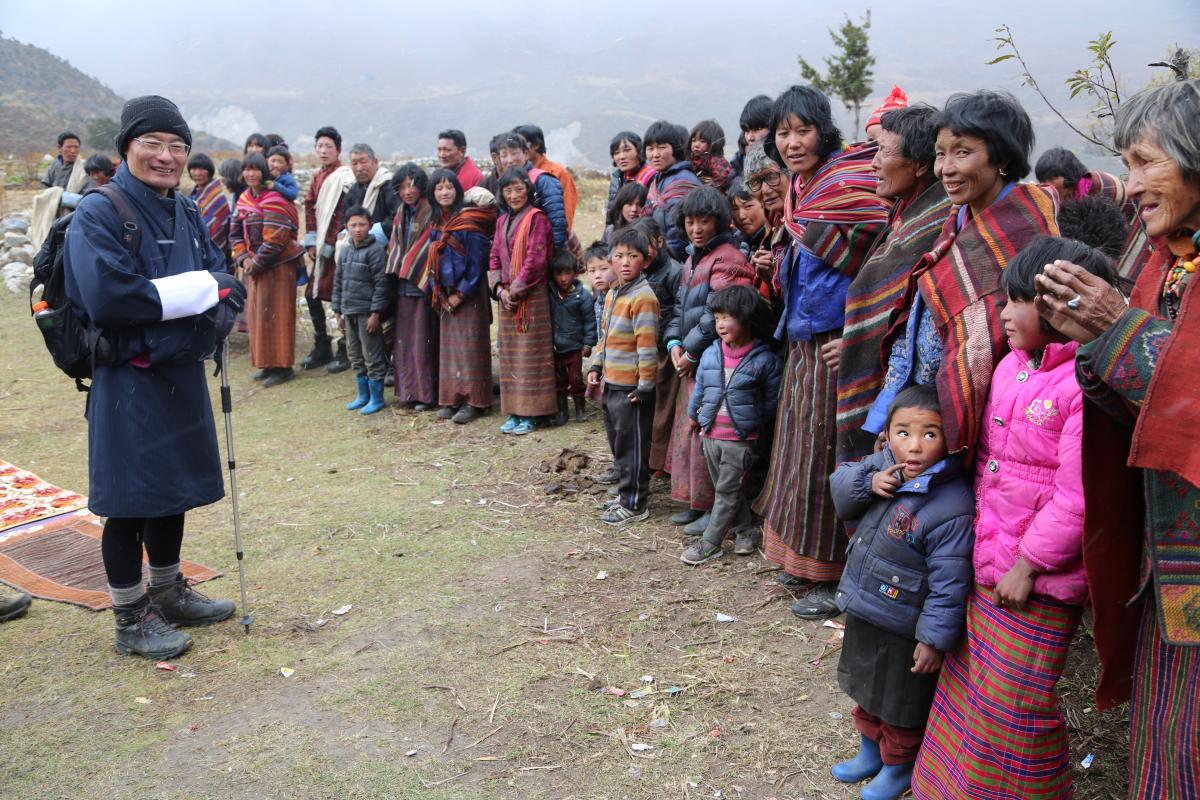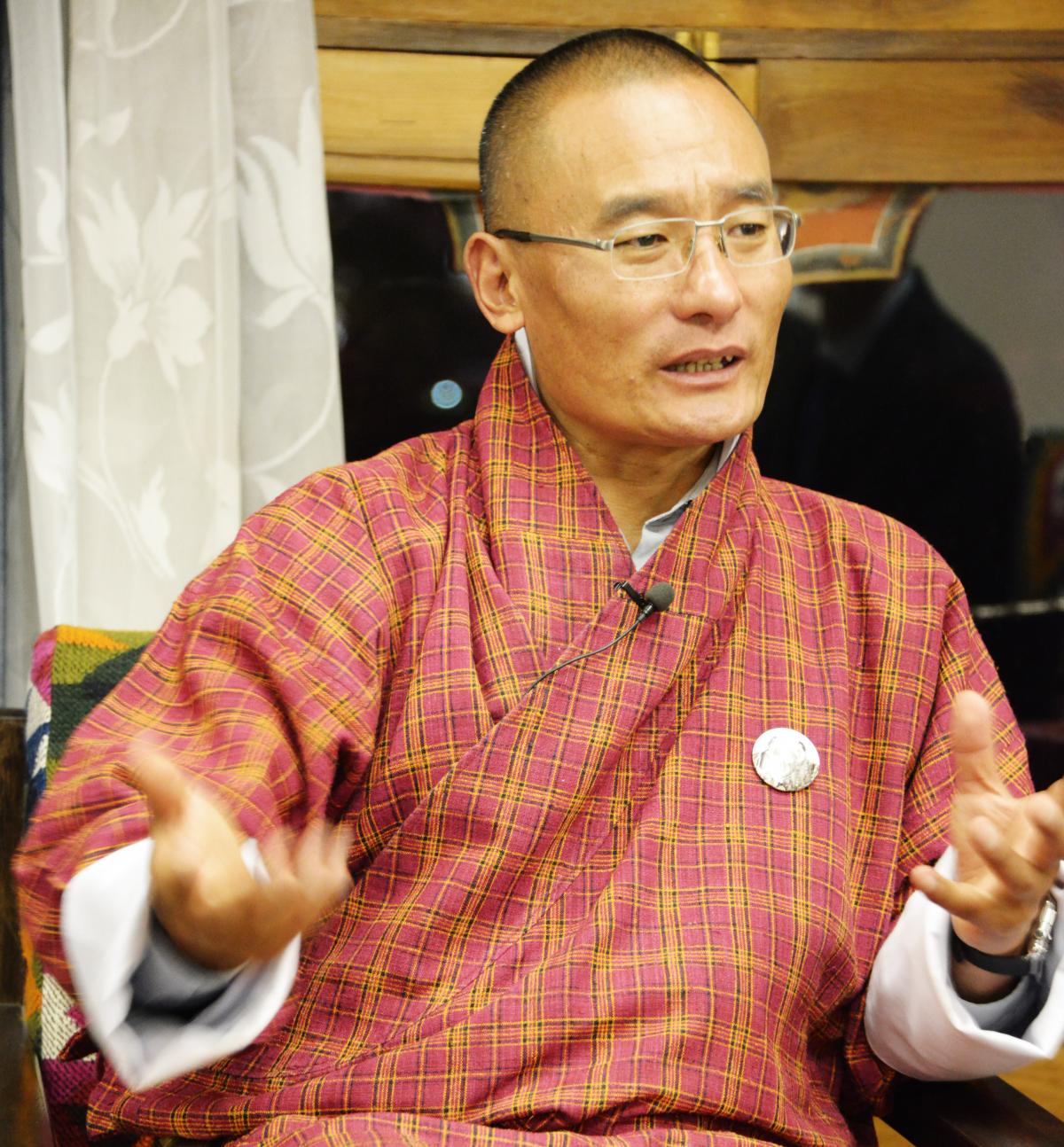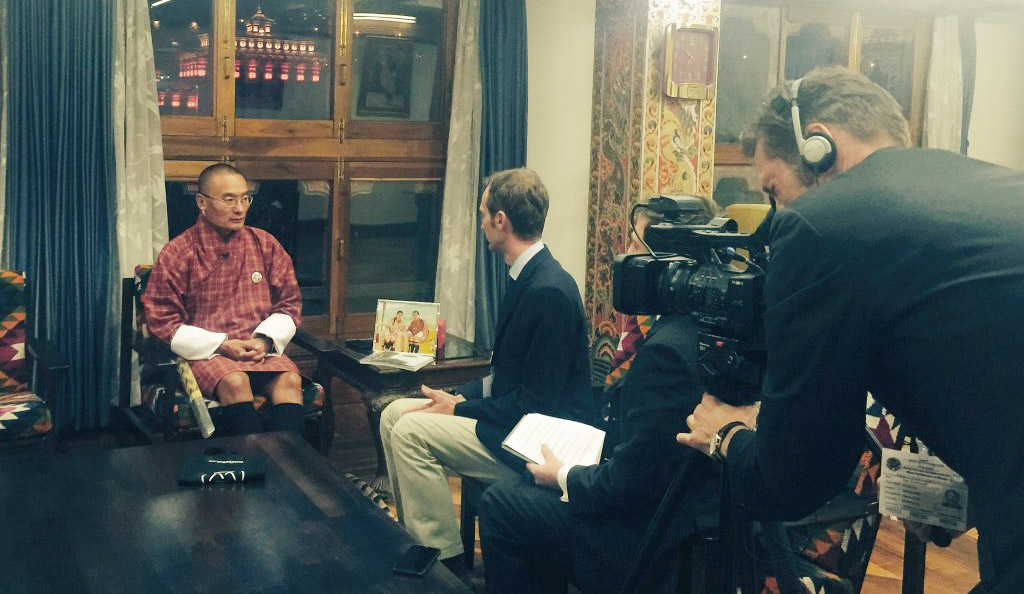Forging Innovation from Tradition
Tshering Tobgay speaks about how Bhutan is facing the challenges of preserving its own identity and cultural heritage as it seeks its place in the international community.
Cover Photo: Tshering Tobgay interviewed by Peter Biľak and Jonah Goodman. (Photo: Taco Zwaanswijk)
*Tshering Tobgay is only the second prime minister to govern the Himalayan kingdom of Bhutan since its first democratic election in 2008. Like every Bhutanese official, he talks about the Gross National Happiness philosophy which prioritises well-being over financial growth, but he also identifies Bhutan’s great challenges (employment, economics, infrastructure) and is taking concrete steps to transform his country. Since his election in 2013, Bhutan has become one of the world’s fastest-growing economies while maintaining its unique status as a carbon-negative country. Bhutan provides free education and healthcare for all its citizens, addresses issues of gender equality by recruiting women into important decision-making committees, supports rural farmers with free electricity, and provides local entrepreneurs with low-interest loans.
We met with Tobgay in his office in Thimphu, right after his return from Lunana, in the remote province of Gasa where he was holding meetings in preparation for a new five-year economic development plan. Even in this day and age, the best way to get to Lunana is a week’s hike across the Himalayan peaks. Obviously the prime minister is in great physical shape, but he is also able to negotiate the unique conditions of the country, bringing a much-needed pragmatism to the table, as well as the ability to improvise. We spoke to the prime minister about Bhutan’s development and the preservation of its culture.*

Just before our interview Prime Minister Tshering Tobgay visited Lunana, a remote village in the Himalayas, to meet his constituents. The trip there and back is a six day hike each way; no faster option exists. (Photo courtesy of the PM’s office)
What are the current priorities and challenges facing Bhutan?
You know that we are transitioning to a democracy? It was His Majesty the King who introduced democracy to our people; our people didn’t want democracy. It’s only been about eight years since we introduced democracy in the country, so one of the primary challenges has to be institutionalising it and getting people to understand its principles. But other than that, one of our biggest challenges is that we have to strengthen our economy. We have one of the smallest economies in the world, and we have to strengthen it because we need to create jobs. Increasingly, almost all our children are in schools now, and they will graduate and they will need jobs.
So on the one hand, we need to strengthen our economy and diversify it to create jobs, but on the other hand we need to ensure that agricultural productivity increases, and that staying on the farms remains a viable and worthwhile career.
What role does new technology play in Bhutan? And what role will it play in the future?
Technology is pervasive now, especially modern technology, and especially those technologies driven by the Internet. And that’s good. Technology provides us the opportunity to boost development, to boost education, the economy, communications. The entire government is on an Internet platform and we are trying to go paperless even as we speak. We can reach out to any school and interact directly, primarily with the principal, but also with the whole staff. We can interact with every civil servant throughout our country. We have an Internet-based performance management system, so we can see how our civil servants are performing, but increasingly, what we call G2C, Government to Citizen services, are all Internet based and I myself monitor if there are backlogs, and if so, where they are, and how efficiently services are being delivered. In healthcare, telemedicine is a bit expensive, but that said, we do use technology, whether it’s just a telephone or a Facebook group where doctors consult one another, or a GPS-based system that tracks the movement of ambulances. So yes, we are using and benefiting from technology, modern technology.
Brand Bhutan is not about using branding to sell our country or to sell its products, no. It’s about celebrating what we value, it’s about celebrating our identity and who we are. It’s not necessarily about extracting something from Bhutan and selling it to the world.
Are there other ways that technology promotes democracy?
Yes, yes. First and foremost in elections. We have EVMs, Electronic Voting Machines, and our people have accepted them. And when I was in the opposition I used social media a lot. I still engage with people on social media, and I would like to use it a lot more; however, time constraints make it a bit more difficult. Members of Parliament hold virtual conferences throughout the country so that they can interact with their constituents through video conferencing, so that is another use of technology for democracy.
Do technology and economic development threaten to compromise Bhutan’s unique culture?
I think that technology is just a tool; a culture and its value system are deeper. If technology destroys value systems then something is wrong with the values themselves, so technology just facilitates, expresses what is already there.

You don’t think that technology affects traditional values?
It shouldn’t but that’s not to say it won’t, therefore we must be aware of the danger and of the threats, and we need to educate ourselves. We need to use technology responsibly. But even if there are threats to our culture, technology also has advantages. Going back to social media, we can use social media irresponsibly, celebrating things that could actually destroy our culture, or we can use social media to celebrate our traditional values and our culture in such a way that we promote them and make them relevant in today’s world.
Many of Bhutan’s engineering solutions are imported from other countries. How do you hope to encourage home-grown ingenuity?
In two ways. One is by engaging our Bhutanese intellect, Bhutanese engineers, Bhutanese designers directly, rather than just waiting for foreign intelligence and foreign designers and foreign engineers. We have to use our own people. The other way is that we have to nurture our own heritage. For instance, we are rebuilding and renovating many of our monasteries and fortresses, what we call Dzongs, and those are now designed by our own people. We are renovating them and expanding them in a manner that is consistent with our culture and our heritage. That is an example of Bhutanese ingenuity. And the way we are expanding agriculture, on our own farms in our own way, that is again driven by our own genius.
What do you imagine Bhutan will be like in the future?
Content, secure and happy. As a nation what we value most is the fact that we live in harmony. Throughout our society we have a love for our king, and the institution of monarchy will serve our future very well, and therefore I would like to see institutions that we celebrate today becoming even stronger tomorrow. Whether it is our culture, whether it is our spirituality, our community value systems, our family systems, our form of democracy, I see all of them going from strength to strength, all of them under the guidance and leadership of our king. I see our people continuing to enjoy peace, harmony and happiness in the future as we do now.
What role does Bhutan play internationally?
Firstly Bhutan is for Bhutan. Outside of Bhutan, we are a member of the world community, and therefore we should engage with the world, yes. We should learn from the world, and where possible, we should share with the world.
What can Bhutan learn from the world?
The world contains a tremendous amount of experience, so whether it’s art and culture or leading technology, we have learned from and we must continue to learn from the rest of the world.
Normally branding is linked with marketing, and marketing is linked with consumption, but that is not the way for us to go. I believe that Brand Bhutan is a celebration of who we are and what we are, and we need to be very deliberate about how we promote ourselves and our products.
And what do you think the outside world can learn from Bhutan?
All of us can learn from each other. All of us. But it’s not for any one society to say ‘learn this’, and therefore we need to engage with one another a lot more meaningfully, a lot more sincerely, a lot more actively, so that all of us can become more secure and all of us can become happier, and it is the same with Bhutan. It is not for Bhutan to say ‘you can learn this, this, this’, because what others want may be different. It is up to the context and the priorities of the other people. What may be attractive to one group of people may be totally unattractive to another, and so it is with Bhutan also. What we choose to learn, what we want to learn, what we want to import from one country may be different from another country. Similarly, what Bhutan may have to share with other countries will also differ from country to country to country.
What should Bhutan’s government provide to allow its citizens to live their most fulfilled lives?
Security, and that security first and foremost has to be rooted in our institutions, our monarchy, our spirituality, our sovereignty, our culture, our family, our community. Security must be provided in the form of the continuity of these institutions and values.
And in terms of education?
Education is enshrined in our constitution, so our kings have started a wonderful system where in spite of the fact that we are such a small economy, all people are given a free education and free healthcare. And free basic education and free basic healthcare are mandated by the constitution, so they are a responsibility. If future governments don’t provide free education and free healthcare, then they would be acting unconstitutionally.

Tshering Tobgay in his office in Thimphu with his ceremonial sword on his right and a copy of WTW and a photo of K4 and K5 on his left, as well as Peter Biľak, Jonah Goodman and Taco Zwaanswijk.
How is the Internet changing expectations in Bhutan?
Expectations are supposed to change. Education is supposed to change expectations. With education, if you don’t have a change in expectations then something is wrong. Similarly, with technology, if you don’t have a change in expectations, something is wrong. Now the question should be whether those expectations are good or not, fair or not, doable or not, achievable or not, and that’s an entirely different area. So expectations must be constructive and must be achievable.
As in many areas of the world, youth unemployment is an issue in Thimphu. What do you believe has caused this, and how can the government improve the situation?
On the one hand we have to strengthen, expand and diversify our economy to create jobs. On the other hand, we also have to make the existing jobs attractive. It’s not that there aren’t jobs; there are many jobs available in construction, agriculture and many other areas. The problem is they are not attractive enough for our people, and we need to make them attractive, but as I said, we also have to diversify our economy so that many more jobs can be created, and the best way to create jobs is through self-employment. We need to have a sense of entrepreneurship, and we need small industries, small and medium enterprises throughout our country where people can harness their entrepreneurial spirit to actually create their own jobs.
What are some of the practical measures to promote entrepreneurship in Bhutan?
We are making doing business easier. The World Bank has a Doing Business index in which we have improved by leaps and bounds in a matter of one year, from I think about 140-something to the 70s in a year and a half. We need to make doing business easier, but we need to work with our people so that they understand that entrepreneurship is not bad, it’s good, and they should go after their ambitions. But to allow them to do that, we also need to support them, and so for instance, all rural businesses are tax exempt. We also have something called the Business Opportunity Information Centre, which provides subsidised loans at 4%. At a commercial rate you would be lucky to get a 13% loan, but we provide a 4% loan as well as other support. These are all measures to help our entrepreneurs fulfil their potential.
The other thing is to promote the dignity of labour, to celebrate skilled work. There are many ways we do that. It starts from the school system and it starts by example, by personal example. We are providing government bonuses to construction contractors who hire 100% Bhutanese. We have a state-owned construction company that employs all Bhutanese. So there are many ways of doing it, and we need to do a lot more.
How does economic development coexist with Bhutan’s efforts towards cultural presentation? These two things are often conflicting interests.
The purpose of cultural preservation is for ourselves, it’s not for the world. If you are attracted to us, that’s a bonus. But the main purpose is for us to have a better understanding of who we are and to celebrate who we are.
Does the increased number of tourists have a negative impact on Bhutan?
Yes and no. Yes, it could have a negative impact; no, because tourists, like yourself, you come here and reinforce our own love of our culture. If you as a foreigner, as a tourist, are so happy with the culture as it exists and is celebrated in Bhutan by the Bhutanese, that reinforces the impulse for us, the Bhutanese ourselves, to believe that our culture is worth protecting. Not just for ourselves but for the world.

